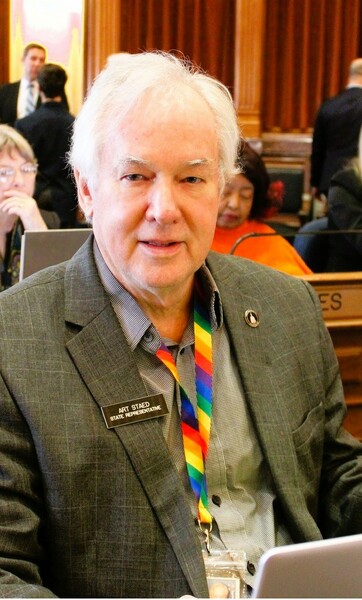


Art Staed, a dedicated public servant and community leader, was born in Joplin, Missouri, and raised among 10 siblings. His journey of service and leadership began with a solid educational foundation, starting with his graduation from McAuley Regional Catholic High School. He furthered his academic pursuits at Rockhurst University in Kansas City, earning a college degree, and later obtained a Master’s degree in Secondary Education at The University of Missouri at K.C. He continued his educational journey with a second Master’s degree in Secondary Administration from East Central University of Oklahoma. Art launched his career in education as a math, science and social studies teacher in private schools in Kansas City Missouri, and later, public school in Shawnee Mission, Kansas. He moved to Oklahoma where he held positions as high school teacher, administrator and principal of an alternative school for at-risk students. Art's passion for education led him to initiate a 'Communities in Schools' program, addressing the needs of at-risk students through mentoring, tutoring, mental health assistance, and counseling. This program gained national recognition at a White House ceremony, showcasing the success of innovative business-school partnerships. Troubled by the high rate of domestic violence in his community, Art co-founded The Family Shelter of Southern Oklahoma, providing a safe haven for victims and actively contributing as a board member. Temporarily leaving the field of education, Art entered the realm of cellular communications, where he quickly ascended to roles such as direct sales supervisor and manager of numerous retail stores. His responsibilities included market identification, store location scouting, lease arrangements, remodeling, and the recruitment and management of store personnel. Art's expertise brought him to Cedar Rapids as a national trainer, overseeing management, sales, and business development courses. Returning to public education after updating his credentials, Art taught Business Management and Time Management courses at Kirkwood and developed workforce training at the Iowa Workforce Development office in Cedar Rapids. He later joined the Cedar Rapids Community School District as the district's Social Studies Facilitator. Together with his wife Susan, Art owned and managed Coffee Talk Café, a successful small business that also served as a community gathering place. Art hosted "Coffee Talk: Corridor Conversations," a video series featuring discussions with local leaders on issues affecting the Cedar Rapids community. In 2007-2008, the citizens of Northeast Cedar Rapids elected Art Staed as their representative to the Iowa House. During his tenure, Art served as Vice Chairman of both the Education Committee and the Economic Development Appropriations Subcommittee, representing Iowans on the Economic Growth, Labor, and Veterans Affairs committees. Art's legislative achievements were diverse and impactful. On the Education Committee, he championed efforts for universal preschool, increased funding for K-12 education, and improvements to teacher salaries. He played a pivotal role in supporting STEM initiatives, community colleges, and universities. In Veterans Affairs, Art focused on assisting Iowa's veterans, advocating for financial assistance programs and overdue Vietnam Veteran Bonuses. As part of the Economic Development Appropriations Subcommittee, he contributed to the creation of the Iowa Power Fund, promoting renewable energy and job creation. At the conclusion of his first term, Art Staed left a legacy of fiscal responsibility, with a balanced budget, substantial reserves, and a solid financial foundation. Today, Art continues his dedication to the community, actively engaging with voters in Cedar Rapids, where he resides with his wife Susan. They are proud parents of four children and grandparents to five grandchildren. Art is currently in his 7th term as a Representative, now serving House District 80 which encompasses Northeast Cedar Rapids, Hiawatha and Robins. His committee roles include Ranking Member of Economic Growth and Technology, Education, Local Government, Natural Resources, and the Education Budget Subcommittee.
1. The state budget and poor future planning – putting the quality and availability of state services in jeopardy: elderly care to education to health care to mental health to environmental quality to law enforcement to the justice system. With the coming drop in state revenue, all of the services supported by the state’s general fund are at risk of being cut. Tax cuts passed in 2022 will force down revenues — by $1.4 billion in FY 2026, $1.8 billion in 2027 and $1.9 billion in 2028. These cuts are large. The immediate impacts are currently shrouded by a blanket of $2 billion surplus in reserves due to federal recovery money that is ending soon. This, along with a voucher program costing approximately $1 billion every four years, means the challenges will only intensify over the next few years. The budget/revenue issues should be addressed now. 2. Correct a decade of poor investments and recommit to supporting public education. Start by passing a State Supplemental Aid percentage that is above the rate of inflation and set the funding for 3 to 5 years into the future so that public school districts can plan for staffing, offerings and innovation. Offer universal preschool and full day kindergarten. 3. Failure to adequately address public health care issues, including access to maternal care, elderly care, and mental health services for Iowa children and families. Exacerbating the problems is a growing shortage of physicians, nurses, therapists and direct care workers. The legislature must adjust Medicaid reimbursement rates for providers, raise the minimum wage and invest in incentives to attract and retain the professionals needed for our health care system.
We are facing a severe workforce shortage that will force companies to move out of Iowa if we don’t act soon. One issue facing prospective employees is the childcare crisis. We can provide incentives for more businesses to offer childcare, increase childcare provider wages and allow more lower-income families to qualify for childcare tax credits. It’s also essential that every child graduates from high school with the skills necessary to continue their education or get additional skills training. We need to make public schools our top priority again. preparing all of Iowa’s children to meet the future demands of our economy and this begins with a strong educational system. Allocating resources to sustain and improve educational programs should be the first step in setting the state budget.
Yes. I’ve supported several versions of hands-free bills in recent legislative sessions. It’s both a safety and economic issue for Iowans. Distracted driving has caused injuries and fatalities on our roadways and increased car insurance premiums for everyone.
Last session, Democrats introduced a package of nursing home bills, which would increase oversight over the lowest-performing facilities, invest in alternatives to facility-style care, and increase staffing. One of those initiatives establishes a $15/hour minimum wage for direct-care workers that will rise to $20/hour over a period of years and then match inflation. Increasing the wage offered to direct care workers and nurses will help attract them to Iowa and encourage younger Iowans to consider entering these professions. Direct-care worker and nurse shortages are a critical part of the problem.
Yes. It’s an Iowa-specific issue and we are responsible to Iowans and should openly and meaningfully address cancer research and treatment. Democrats offered an amendment to the HHS budget last Session that would have funded a variety of cancer research initiatives through our Regent Universities. This would include funding for the Dept. of Health and Human Services to award projects that perform research focused on identifying the reason for Iowa’s high cancer rate, and ways to reduce cancer incidents. We need to expand access to cancer treatments as well.
Implement new measures to address two of the most significant water quality problems – stream nitrate pollution and e coli. This would include establishing a water quality base, stream monitoring, and identification of sources. Encourage largest contributors of nitrate pollution to partner with the state in reducing the flow of nitrates from their fields. The state could assist with funding projects that can demonstrate actual improvements in water quality. The legislature should give the DNR and Iowa counties more authority to enforce manure management practices and the siting of new and expanded CAFOs that threaten our public waterways and the environment. The new measures need to be taken as everyone should realize that the voluntary Nutrient Reduction Strategy is not sufficient.
Democrats offered a bill which would expand the ability of schools to provide professional mental health services in-house. This would ensure that students have stable and clear access to support for their individual needs. The legislature passed legislation that reorganized the state’s mental health and disability regions into new behavioral health districts. The change is intended to bring additional state oversight and structure to what was a fragmented system of delivery across the state. These changes become effective July 1st of next year. Time will tell. The addition of Access Centers has been an effective approach and should continue to be supported. We need to address mental health services for Veterans, lack of psychiatrists and therapists and the shortage of beds. Iowa must continue to invest in mental health to match the growing needs of services, short and long-term. To determine whether measures are effective, Iowa should gather data from those with mental health needs and those who provide services, identifying where timely mental health care is successful across the state, whether licensed providers are available, and whether they accept Medicaid.
Iowa women deserve the right to make their own reproductive health care decisions with their medical team and family. They should have access to pre- and post-natal care. The legislature should repeal the 6-week abortion ban.
No. This is not based on scientific evidence and these bills are a threat to invitro fertilization and some forms of contraception. IVF is a valuable tool to help individuals start a family. The legislature should not have a role in these personal and medical procedures
Improving Iowa’s public education system requires adequate funding so that our public schools have the necessary resources to help every child reach their potential. Curriculum decisions require a focus on empowering educators and supporting their curriculum decisions. Vetting curriculum standards and guiding what students are taught should be left in the hands of local communities where students’ needs can best be served. Educators are the backbone of the education system, not the state legislature. Iowa needs to shield education policies from national, political agendas and cultural wars. Education should be about fostering critical thinking and intellectual growth, not partisan ideologies.
Invest in a world class public education system. Businesses want an educated workforce. Provide assistance, partnerships, apprenticeships for local businesses, provide family-sustaining wages and invest in quality of life in Iowa communities with cultural and recreational opportunities. Ensure that we have clean water and safe communities.
